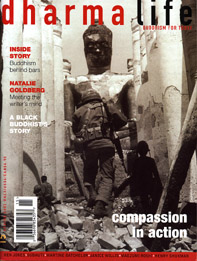Ghostwritten
David Mitchell
US: Random House, 2000, $24.95 h/b
UK: Sceptre, 1999, £10 p/b
Why do things happen? That’s the big subject for novels. Why did Anna throw herself under the train? Why did Raskolnikov repent? Chance or fate? An old choice, and neither convinces, so rewind the tape and try to figure it out. A character in David Mitchell’s Ghostwritten ponders a rugby match:
‘When the players are out there the game is a sealed arena of inter-bombarding chance. But when the game is on video then even the tiniest action already exists. The past, present, and future exist at the same time: all the tape is there, in your hand. There can be no chance, for every human decision and random fall of the ball is already fated. Therefore, does chance or fate control our lives? Well, the answer is as relative as time. If you’re in your life, chance. Viewed from the outside, like a book you’re reading, it’s fate all the way.’
Having lost the belief that we can ever really know the causes of an event, we have also lost faith in omniscient narrators. They peered down on the lives of their creations like spy satellites fixing their lenses, or they pried into their consciousness like a migrating spirit (both cues that Mitchell picks up). Contemporary novels tend to follow or be narrated by a character who participates in the story, who cannot know the context in which they were living (just as we can’t know the contexts of our lives). They cannot know their true motivations, nor the consequences of their actions that ripple out beyond their view.
Beneath character and plot lie the mysteries of subjective experience and causality. This is where Buddhism comes in. Or at least it could and should, because these are its abiding concerns. A Dharma novelist worthy of the name will know that things arise in dependence upon conditions: some of the conditions we know, some are mysterious – and both kinds are important.
Think of the universe of human consciousness as it exists right now – six billion minds whirring away, trying to make sense, trying to cope: loving, fearing, desiring. Why are they the way they are? Let’s say it’s conditions (knowable, and mysterious). But you cannot separate the conditions that impinge on someone from the way those conditions are experienced. So imagine you could download into a consciousness, like a computer file downloading from the internet (and Mitchell plays with this, too) into any one of those six billion. You could know how it felt to be Chinese or Russian, you could switch sex, experience growing old or dying, and then switch out again. But could you both inhabit that subjectivity and at the same time step back to see the causes and the effects?
That is what David Mitchell attempts in Ghostwritten, and he is a candidate to be the first real Dharma novelist in the modern world. The book comprises 10 linked monologues, each character occupying a radically different set of values, drives and pre-occupations. It starts with a Japanese fanatic who has set off a subway sarin gas attack. Then come a Japanese teenager falling in love, a financial lawyer in Hong Kong whose shady dealings are catching up with him, a Chinese peasant, a St Petersburg criminal, a London musician and ghostwriter, a quantum physicist on the cusp of a breakthrough, a New York late-night chat show host. And there are two disembodied consciousnesses whose identities I shall not divulge.
Ghostwritten also shows a world shot through with Buddhism, from the millennial distortions of Aum Shinrikyu, to the giant Buddha in Hong Kong, a long-suffering Chinese devotee, a Gelugpa performing consciousness transference, a ‘sort-of-Buddhist Londoner’, and a computer called Arupadhatu (which is the sphere of no form, because we might as well say that is where a computer consciousness would exist).
Each has a wonderful story to tell, and Mitchell has a generous imagination. He could have devoted a novel to any of these characters, and a lesser writer would have hoarded the ideas that pour out of each page of Ghostwritten. Mitchell is an excellent stylist who can give you lyricism, fear or compulsion as his story requires. As his perspective transmigrates from subject to subject he touches into a range of genres, including the thriller and science fiction, But above all, with the aid of numerous literary influences, he manages superbly the 10-fold ventriloquism required to articulate his personae.
Establishing each voice is important because it articulates a worldview. Mitchell writes others’ lives like a ghostwriter. But, as one of the characters suggests, our lives are themselves a form of ghostwriting, scripted by forces beyond us, even though we claim to be their authors.
This is Mitchell’s first novel, and it reminded me of other first novels like Catch 22 or A Portrait of the Artist as a Young Man. It creates a form tthat is able to express a new kind of consciousness, and a new experience of the world. This is a novel for the interconnected, globalised times in which we are buffeted among billions; it offers not so much an answer as a neural network of thought, not so much an argument as ideas whirring like minds, and interacting like electrons.
Vishvapani is Editor of Dharma Life



